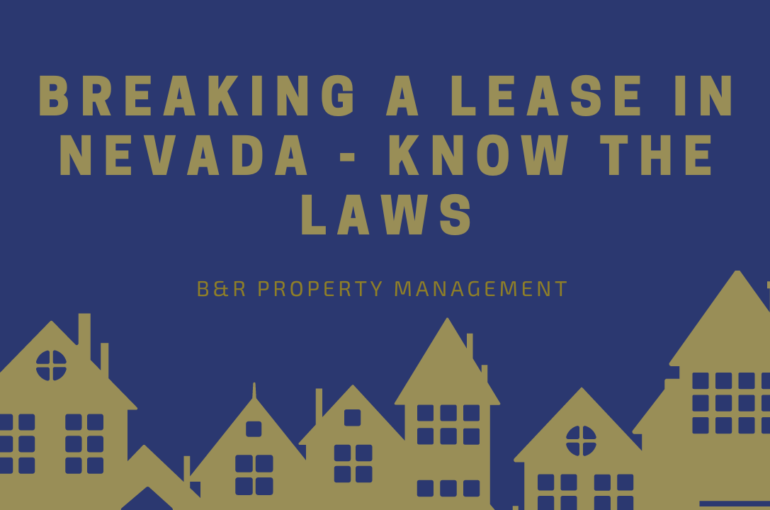Breaking a Lease in Nevada – Know the Laws
Breaking a Lease in Nevada – Know the Laws

In this article, the team at B&R Property Management will explore the legal reasons for a tenant to terminate their rental lease early without facing penalties. We will also go over the unjustified reasons for breaking a rental contract the landlord can be well informed when it comes to both landlord and tenant law and their rights in this situation.
Rental Agreement in Nevada
A lease agreement that is easy to understand is essential to avoid any confusion. When a new tenant signs the lease, make sure that they understand the rent terms of the agreement and that they are conscious of penalties for ending a rental lease early without just cause. It is also the responsibility of the landlord to ensure tenants understand their right to legally break a lease.
The rental agreement should also include the amount of proper notice a tenant must provide the landlord when ending the lease. Under Nevada law, a tenant is required to provide their landlord with the following notice:
In Nevada, the required number of days for notice will depend on whether the tenant rent on a weekly or rent on a monthly basis. Residents are mandated to provide 7 days notice if they are renting on a weekly basis.
They need to provide 30 days written notice if they rent on a monthly basis. However, tenants are not required to send a notice if their lease has a fixed end date because it will automatically expire on the last day of the lease.
Landlords are required by Nevada law to make reasonable efforts to re-rent their property. Landlords have a duty to mitigate damages and minimize their losses. If a landlord re-rents the property quickly, the tenant will only be responsible to pay rent while the apartment or rental unit is vacant and not all the rent due under the rental lease.
![[insert alt text: boxes in a living room for re-rent]](https://brprop.com/wp-content/uploads/2022/10/boxes-in-a-living-room-for-re-rent-1024x683.jpg)
Finally, a well outlined lease should include the tenant’s rights to sublet the rental unit.
Unless a landlord clearly prohibit subletting in the lease agreement, Nevada tenants are allowed to sublet the rental property. A landlord has the right to include a provision in the lease that requires tenants to seek their approval before they can sublet the rental unit.
Nevada renters should send a letter of request through certified mail. The letter should include the sublet term, the names of the proposed assignee, the reason for subletting, consent from co-tenants, and a copy of the proposed sublease. As a landlord, you have the right to approve or reject the request. However, a landlord can only refuse the sublease based on legitimate reasons.
Unjustified Breaking of a Nevada Lease
The reasons stated below are not enough on their own to justify releasing a tenant from the lease. A Nevada tenant who breaks the lease due to any of the following reasons have no legal protection against paying fees and penalties associated with breaking the lease.
- Buying a house
- Upgrading or downgrading
- Moving in with someone else
- Moving to a different location to be closer to relatives
- Relocating for a new job or school
If a Nevada tenant breaks their lease for any of the above reasons, without it being a previously approved reason or a reason approved by the small claims court, they will face consequences.

If a tenant needs to break a lease early for any of these reasons, they are allowed to request a mutual termination from their landlord or property management company.
Justified Reasons to Break a Lease in Nevada
1. Early Termination Clause
A landlord may include an early termination clause in the lease agreement that allows a tenant to pre-terminate the tenancy for a penalty. Make sure to include the amount of the penalty fee the tenant would have to pay and the number of days of notice that you’ll require from the tenant.
2. Active Military Duty
When your tenant enters active military duty during the course of the rent or if they get relocated due to deployment or change of station, the tenant is protected from penalties for breaking the rental agreement. The protection starts on the date of entering active military service and ends 30 to 90 days after discharge.
To break the lease justifiably, the tenant should provide the following:
- Proof that the rental contract was signed before entering active duty.
- Proof that the tenant will remain on active duty for the next 90 days or more.
- A written notice with a copy of the orders to deploy or Permanent Change of Station (PCS). A letter from the commanding officer stating the tenant’s pending deployment will also suffice.
3. Unlivable Unit
Under Nevada law, it is the landlord’s duty to provide tenants with a habitable place to live. If the unit does not meet the minimum standards in accordance with Nevada’s specific health and safety codes, a tenant may be allowed to legally break the lease early without penalties.

It’s important to understand it is the landlord’s responsibility is to provide a habitable space for their tenants. The landlord must make the necessary repairs as soon as possible, within a reasonable timeframe, to avoid any issues.
4. Violation of Privacy
In Nevada, landlords are mandated to provide at least a 24 hours’ notice before entering the property. The date and time of entry is only allowed at reasonable times. A landlord should also not change the locks without the permission of the tenant.
5. Other Reasons
Under Nevada state law, a tenant may be allowed to justifiably break a lease for reasons including domestic violence, landlord harassment, sexual assault, and stalking. Also, tenants who have a physical or mental disability or are 60 years old or older may be allowed to break the lease early if their condition requires them to relocate.
Conclusion
Understanding the terms and conditions related to breaking a lease can help you become a better landlord. If you’re a landlord and have any questions, or if you need help managing your rental property, don’t hesitate to contact B&R Property Management at (702) 454-2561 and we’ll be happy to assist you!
This blog should not be used as a substitute for legal advice from a licensed attorney in your state. Laws change, and this post might not be updated at the time of your reading. Please contact us for any questions you have in regards to this content or any other aspect of your property management needs.



